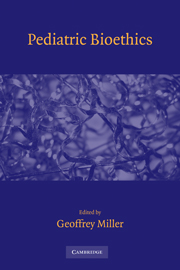Book contents
- Frontmatter
- Contents
- Contributors
- Preface
- A THE FOUNDATION: THEORY AND PRINCIPLES
- 1 Virtues and Goals in Pediatrics
- 2 Contributions of Ethical Theory to Pediatric Ethics: Pediatricians and Parents as Co-fiduciaries of Pediatric Patients
- 3 Using the Best-Interests Standard in Treatment Decisions for Young Children
- 4 The Moral and Legal Status of Children and Parents
- 5 The Ethics of Pediatric Research
- 6 Truth Telling in Pediatrics: What They Don't Know Might Hurt Them
- 7 Pediatric Ethics Committees
- B GENETICS AND THE NEWBORN
- C THERAPIES
- D END OF LIFE
- Index
7 - Pediatric Ethics Committees
Published online by Cambridge University Press: 07 May 2010
- Frontmatter
- Contents
- Contributors
- Preface
- A THE FOUNDATION: THEORY AND PRINCIPLES
- 1 Virtues and Goals in Pediatrics
- 2 Contributions of Ethical Theory to Pediatric Ethics: Pediatricians and Parents as Co-fiduciaries of Pediatric Patients
- 3 Using the Best-Interests Standard in Treatment Decisions for Young Children
- 4 The Moral and Legal Status of Children and Parents
- 5 The Ethics of Pediatric Research
- 6 Truth Telling in Pediatrics: What They Don't Know Might Hurt Them
- 7 Pediatric Ethics Committees
- B GENETICS AND THE NEWBORN
- C THERAPIES
- D END OF LIFE
- Index
Summary
INTRODUCTION
Ethics committees have become nearly ubiquitous in American hospitals in the past quarter-century, and their use has been widely endorsed. The Universal Declaration on Bioethics and Human Rights recommends the use of independent, pluralistic, multidisciplinary ethics committees to provide advice on ethical problems in clinical settings and to establish educational forums for the discussion of issues in bioethics. The Joint Commission on Accreditation of Healthcare Organizations has mandated that every health care organization in the United States have a mechanism in place to address ethical confl icts, and for the majority of hospitals this requirement has been met by the creation of an ethics committee. The American Medical Association (AMA) and the American Academy of Pediatrics (AAP) have endorsed hospital ethics committees and have provided specific guidelines for their use. The early proliferation of these committees occurred partially in response to landmark cases involving neurologically incapacitated adults, notably Karen Quinlan in 1976. In 1983, the President's Commission for the Study of Ethical Problems in Medicine and Biomedical and Behavioral Research endorsed the creation and use of hospital ethics committees to promote effective decision making for incapacitated individuals. At that time fewer than 1% of all U.S. hospitals had such a committee. In the years since then, ethics committees have become commonplace in U.S. hospitals, and more recently their use in European hospitals has grown as well.
As the use of hospital ethics committees increased, it became apparent that many of the difficult issues confronted by these committees involved infants and children.
Keywords
Information
- Type
- Chapter
- Information
- Pediatric Bioethics , pp. 87 - 108Publisher: Cambridge University PressPrint publication year: 2009
